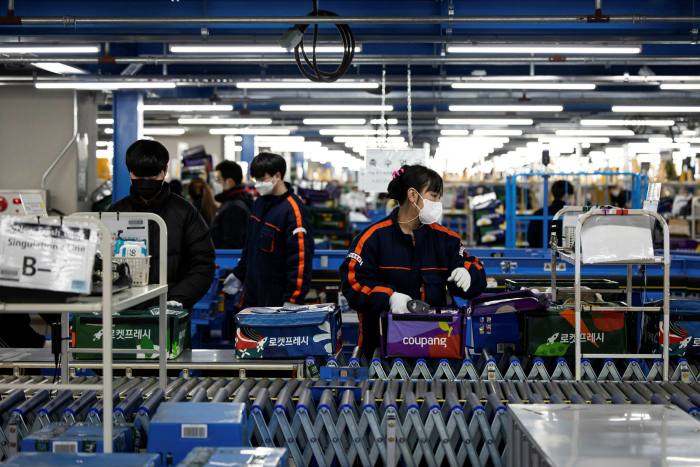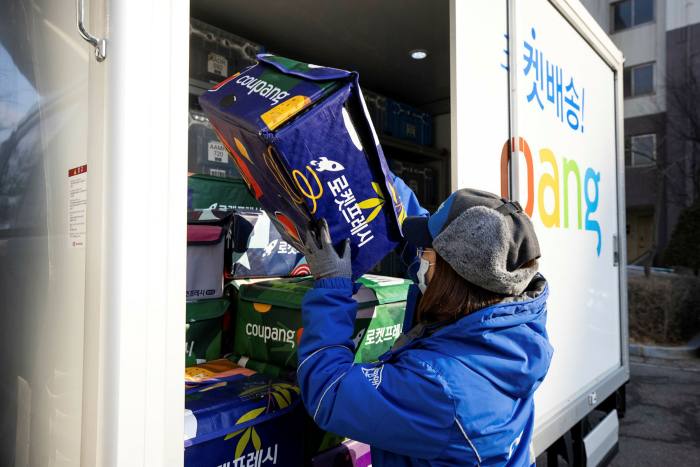Bom Kim, the founder of Coupang, South Korea’s answer to Amazon, is expecting his company to soar past a $50bn valuation when it lists in New York this week.
But back in Seoul, far away from the glitz of the initial public offering, the ecommerce company, which is backed by the likes of SoftBank, Sequoia and BlackRock, is facing political pressure and police inquiries over a series of injuries and deaths among its workers.
According to Korean politicians and the country’s Public Service and Transport Workers’ union, eight Coupang employees have died over the past year as a result of overwork.
This included two Coupang employees who died over the weekend, the union told the Financial Times.
In response to the death on Saturday of a delivery driver, the company said: “The deceased worked around four days a week on average and worked about 40 hours for the past 12 weeks”, adding that his last day of work was on February 24.
“The company will actively cooperate in the processes of determining the cause of death, and will spare no efforts in providing all supports to relieve the pain of the bereaved families,” the company added. “Coupang will further endeavour to protect the health and safety of the workers even more thoroughly.”
Coupang declined to comment on the broader allegations.
The company has declined repeated requests from the FT for interviews over the past two years.
Analysts said that while the issues were unlikely to dampen investor enthusiasm for this week’s IPO, they raised questions about the sustainability of Coupang’s long-term growth.
“Investors are not paying much attention to Coupang’s labour issues yet, although there are certainly problems with the workload and labour intensity and its ill-treatment of workers,” said Yoo Seung-woo, an analyst at SK Securities.

In its IPO prospectus, Coupang warned that some of its operations were “subject to certain detailed and complex fair trade, labour, employment, and workplace safety laws and regulations, which continue to evolve and have and will continue to affect our operations and financial performance, could subject us to costs and penalties, and may affect our reputation”.
Coupang touts its technology
Kim, a 42-year-old Harvard dropout, started Coupang as a site offering deals to group buyers. With aggressive marketing and cheap deals, it became hugely popular and was the top app in Google’s Korea Play store last year.
In recent years, Kim has spent heavily on building a logistics network of 100 fulfilment centres across 30 cities. Coupang now boasts that nearly 100 per cent of its orders are delivered either the same or the next day.
The company says this network is how it outcompetes its fierce rivals, such as Gmarket and Auction, owned by Ebay, and traditional Korean retail giants including Lotte and Shinsegae.
Korean labour activists have drawn some parallels between Coupang and Amazon, but say that Coupang’s operations are much less automated than those of the Seattle ecommerce group, and much more reliant on manual workers. They added that Coupang’s biggest innovation was using data and artificial intelligence to find ways to squeeze those workers.
Go Geon, a former worker at the company’s warehouse in Bucheon, south-east of Seoul, tore his left hamstring while hurrying with a box in one of the company’s warehouses, and was asked by his manager not to lodge a complaint. “Hamstring injuries typically happen to professional athletes,” he said, but added that such injuries “have become like part of the job”.
According to warehouse employees, if they fall behind hourly targets they face public shaming — and the targets are continually rising. In particular, workers said there was a huge drive for faster work when Coupang introduced same-day fresh-food delivery in April 2020.
“The company’s obsession with efficiency is hurting workers’ health. Its innovations are the results of driving the workers to the extreme,” said Ryu Ho-Jung, a lawmaker for the progressive Justice Party. “If this situation continues, we will see more workers die.”
South Korea’s Labour ministry carried out a three-month investigation into Coupang’s logistics network last September and said it had found workers needed more breaks and more safety education. It called for medical check-ups for night-time staff.
“We are watching the company’s labour environment with concern,” said a ministry official, adding that the ministry had met Coupang’s executives last month and asked them to remedy the problems.
Companies exploit loopholes
South Korea has strong labour laws for full-time workers, including a maximum 52-hour work week, compulsory one-hour breaks during an eight-hour shift, and mandatory medical insurance for work-related injuries.
But the laws do not apply to temporary workers without contracts, and unions say there are many loopholes. Korean courts have tended to side with companies over workers, although workers at Samsung who contracted cancer while making chips have recently won a landmark case.

Seventeen couriers at other Korean delivery companies, who often work up to 90 hours a week on commission, have died of overwork in South Korea since the beginning of last year, according to the delivery workers union. Coupang’s delivery drivers are full-time employees, and the company said it abided by the 52-hour limit.
But at its warehouses, 90 per cent of workers are day labourers or on short-term contracts, a higher share than at its rivals, according to labour researcher Jang Kwi-yeon.
“One of the biggest complaints we hear consistently from warehouse workers is that their workload at Coupang is much heavier than its ecommerce rivals,” she said.
Coupang said it increased its warehouse workforce by 78 per cent and invested more than Won500bn last year in automating its facilities in order to reduce workload. Nevertheless, the rate of injuries among its workers has grown as fast as its sales, near-tripling to 982 between 2018 and last year, according to the state-run Korea Workers’ Compensation & Welfare Service.
National outcry
In October, Jang Dug-joon, a 27-year-old worker at Coupang’s fulfilment centre in Daegu, was found dead in the bathtub in his home shortly after finishing his night shift.

The case sparked national outcry over worker treatment in the ecommerce sector, which boomed during the coronavirus pandemic. According to a government investigation, Jang had worked for more than 62 hours during the week before his death.
Coupang initially denied Jang died because of his work but later apologised for his death after an official verdict that he died of overwork. Coupang promised to provide support for his bereaved family, but it declined to comment on whether any compensation had been made.
In January, Choi Kyung-ae died of a heart attack on her sixth day working at Coupang, after a nine-hour shift in an unheated warehouse, according to the union and her family.
“It was -14C that night. And she had to work in the cold warehouse, relying on just a hand warmer,” says Kim Chul-soo, Choi’s brother-in-law. “But the company is denying any responsibility and refusing to meet to discuss the issue.” Coupang declined to comment on the case.
Last month Joe Nortman, the head of Coupang’s logistics operations, was summoned to a parliamentary hearing on labour conditions. He apologised for the death of Jang and other workers and vowed to improve the company’s labour environment.
“I deeply regret all these situations. I think it is a tragedy whenever there is any fatality, whether it’s work-related or not. And I feel we’re going to continue to do our best to improve . . . I think the results need to get better. And we are committed to making that happen,” said Nortman, who worked for companies like JCPenny, Amazon and UPS before joining Coupang.
Kim, Coupang’s founder, boasts of being the number one job creator in the private sector, adding 25,000 new jobs last year. But unions and labour activists say Coupang’s day workers or temporary workers suffer from a lack of job security and therefore are unable to voice their opinion collectively against the company’s labour practices and working conditions.
According to the union of Coupang drivers, average individual delivery loads increased to 340 a day by February 2020 from just 57 packages in 2015 but union members say their wages have stagnated. And more than 90 per cent of Coupang drivers quit within a year because of excessive physical work, the union said. Coupang declined to comment on the union’s claim.
A delivery driver working in Seoul’s northern outskirts, who asked not to be named, said he had no time to eat during night shifts that involve delivering packages to about 150 locations.
“It is not surprising at all if your colleague doesn’t show up the next day. You just assume he quit, because the workload is so unbearable. I am not sure how long I can withstand this,” he added.
Coupang has promised $90m of stock options to its frontline workers and non-manager employees, according to the IPO prospectus. But some workers said they were unlikely to be able to remain for the two years needed to fully exercise the right.
“I am afraid that I may die if I work like this every day,” said a 53-year-old worker with the surname Kim at Coupang’s Deokpyeong warehouse.

